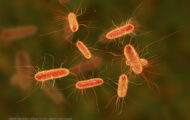Consumers Union, an arm of Consumer Reports, has called on the EPA to ban arsenic-containing pesticides. A National Academy of Sciences/National Research Council (NAS/NRC) meeting being held today "will be the start of a process that could delay government action for at least three years on the risks of arsenic," according to the press release. Exposure to inorganic arsenic is linked to cancer. The National Toxicology Program has classified inorganic arsenic compounds as "known to be a human carcinogen." The government is reviewing the cancer and non-cancer risks from inorganic arsenic after the Environmental Protection Agency (EPA) was directed by Congress to stop work on its prior cancer risk assessment after several years of research. Dr. Michael Hansen, Senior Scientist at … [Read more...]
UCLA Researchers Uncover Link Between Pesticides and Parkinson’s
Neurologists at UCLA have uncovered a link between pesticides and the development of Parkinson's disease. So far, three chemicals - paraquat, maneb and ziram - have been linked to increases in the disease among farmworkers and those who live and work near fields where they are applied. The disease occurs at high rates among farmers and those who live in rural areas. This new study found a link between Parkinson's and benomyl, a pesticide that was used on farm fields until 2001. The study is published in the Proceedings of the National Academy of Sciences. Exposure to that chemical starts a "cascade of cellular events" that may lead to Parkinson's. The pesticide stops aldehyde dehydrogenase (ALDH), an enzyme in the brain, from controlling DOPAL, a toxic metabolite of dopamine. When … [Read more...]
CFIA Study on Pesticide Residues in Coffee, Fruit Juice, and Tea
The Canadian Food Inspection Agency has released a study examining pesticide residues in coffee, fruit juice, and tea. The study is part of the Agency's routine testing of various food products, and was intended to generate baseline surveillance data. The government monitors food "as sold", not "as consumed", so brewed coffee and tea were not tested. Scientists tested 1,074 samples of the products, including 297 coffee samples, 510 juice samples, and 267 tea samples. They were analyzed for more than 430 pesticides. Two of the coffee samples contained detectable pesticide residues. Those were compliant with the government's maximum residue limits (MRLs) of 0.1 parts per million (ppm). For the juice samples, 99.6% were compliant with MRLs for pesticides. Two of the juice samples … [Read more...]
Organic Foods Not Safer, More Nutritious than Conventionally Grown Foods
A new study conducted at Stanford Center for Health Policy and published in the Annals of Internal Medicine questions whether organically-grown foods are safer or more nutritious than conventionally produced foods. This systemic review, which extracts data from English-language studies, says no. Seventeen studies in human beings and 223 studies of nutrient and contaminant levels in foods were examined. There were no long-term studies of health outcomes among people eating organic versus conventionally raised foods. Three of the human studies researched clinical outcomes; those found no difference between populations who ate organic foods and those who ate conventional foods for allergic reactions or Campylobacter infections. Two of the human studies found significantly lower pesticide … [Read more...]
Pesticide Residue Common In Fruits, Veggies and Baby Food
Apples, peaches, nectarine and grapes are on "The Dirty Dozen" list of produce with high levels of pesticide residue, while cabbage, corn and sweet potatoes make the "Clean Fifteen" list with low levels, according to the eighth annual Shoppers Guide To Pesticides In Produce, published today by the Environmental Working Group (EWG). “Our shopper’s guide to pesticides in produce gives consumers easy, affordable ways to eat a diet rich in fruits and vegetables while avoiding most of the bug killers, fungicides and other chemicals in produce and other foods,” EWG president Ken Cook said in a statement. To compile the guide, EWG researchers looked at ten years of data from annual U.S. Food and Drug Administration (FDA) and U.S. Department of Agriculture (USDA) pesticide residue tests … [Read more...]
Methyl Iodide Maker Removes Product from U.S. Markets
Tokyo-based Arysta LifeScience Inc. has pulled methyl iodide, a fumigant for strawberries and other crops, from the U.S. market. There has been a furious debate over this chemical among consumer advocates and scientists. Methyl iodide is a fumigant pesticide called a "pre-plant biocide", used to control soil-borne pathogens and weed seeds in strawberry fields. It was introduced to the U.S. market after methyl bromide was banned because it depletes the ozone layer. An international treaty in 1993 required the phase-out of methyl bromide by 2005. In 2010, in the last days of the Schwarzenegger administration, California approved the use of methyl iodide over objections of state scientists. The Department of Pesticide Regulation (DPR) in that state set exposure levels that were 120 … [Read more...]
Organic Foods Not Always Safer
If you want to eat food that hasn't been sprayed with pesticides or herbicides, buy organic. In fact, certified organic foods are regulated by the USDA and grown under strict guidelines. Synthetic fertilizers, irradiation, and genetic engineering are forbidden. Certification is a long-term commitment that may take years to achieve, since one of the qualifications is that the field has to be free from pesticides for three years preceding planting. Cows, chickens, and pigs raised organically are not fed antibiotics as a matter of course and don't eat feed that has been grown with any 'cide. Testing done on foods has prompted the Environmental Working Group to create a list called "The Dirty Dozen" and "Clean 15". The "Dirty Dozen" list includes produce that is generally high in pesticide … [Read more...]








